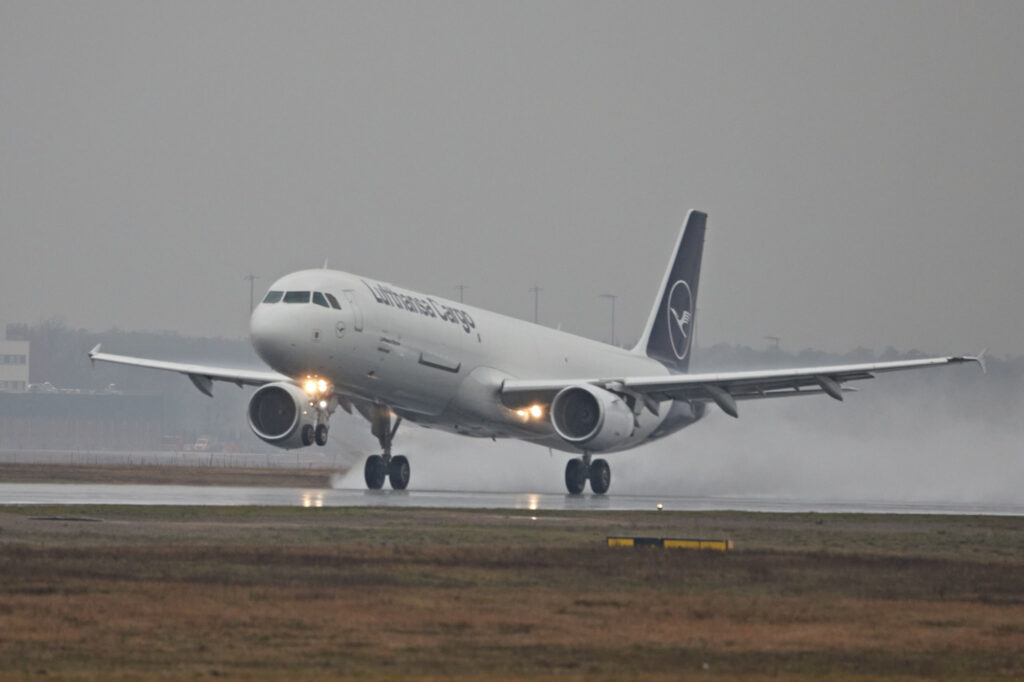Lufthansa Cargo flies high
04 / 04 / 2022

Dorothea von Boxberg Credit: Lufthansa Cargo
Lufthansa Cargo’s fleet investments are paying off with robust revenues but efforts to create and maintain capacity continue.
The German cargo airline saw 2021 revenues increase by 38% year on year to €3.8bn and earnings before interest and tax rise by 109% on a year earlier to reach almost €1.5bn, said Lufthansa Cargo chief executive Dorothea von Boxberg at the airline’s annual press conference in March.
There was 9% more capacity in 2021 than in 2020 but almost 40% more revenues, explained von Boxberg. The airline also saw €79m earnings from investments and subsidiaries.
The pandemic-induced air cargo boom has constrained freighter capacity, added von Boxberg, and overall Lufthansa Cargo was at -22% capacity in November 2021 compared to 2019 because “we couldn’t add to our freighter capacity and were fully affected by the belly shortages”.
Lufthansa Cargo added two new B777F freighters to its 15-strong B777F cargo fleet last year, but its capacity offer has been declining from 2019 because it’s B777F fleet comes with a slight decline in capacity, explained von Boxberg.
Total market capacity was at -8% in in November 2021 v 2019, with freighter capacity up 17% and belly capacity down -27%.
Another increase in belly capacity is expected again this year, but not to the level seen in 2019.
Overall market demand rose steadily in 2020, peaking at the beginning of 2021. “Strong demand meant high load factors and of course has also reflected in the prices we’ve seen in the market,” said von Boxberg.
Load factors kept increasing for both Lufthansa Cargo’s freighter (+2.7% points) and belly (+1.6% points) platforms from 2020 to 2021. Yield was also up 26% in 2021 from the previous year.
Pandemic-related disruption of production and seafreight congestion, as well as the rise of e-commerce, “the single largest growth segment in airfreight”, are driving increased demand for air cargo, von Boxberg pointed out.
Ukraine crisis impact
Lufthansa Cargo expects global market capacity will be approximately 10% down due to airspace restrictions and sanctions for global fleets following Russia’s invasion of Ukraine.
The airline also calculated a 10% capacity reduction for its own freighter operations from Asia Pacific to the European Union.
Its calculation accounts for the aircraft flying on the Asia-Europe route prior to the invasion of Ukraine.
“The assumption was there’s no capacity from other traffic routes getting on that route.” Asian carriers could potentially move aircraft from the trans-Pacific, but this calculation doesn’t incorporate this, said von Boxberg.
She explained how Lufthansa calculated the expected capacity reduction.
“Russian carriers have quite a substantial market share on those routes and the Russian carriers go down to zero. So that’s part of where it’s minus 100%. Then we’ve got carriers like the European carriers and for us it’s approximately -10% on the freighter fleet and there are not so many bellies right now so with a rough sum also -10% for us, and that would also be applying to other carriers out of Europe.
“Then we’ve got carriers like Japanese carriers that now also fly around the Russian airspace and then there are some carriers in the Middle East that aren’t affected at all that fly at 100%. I think that about 10% of the overall capacity will be lacking.”
The closure of Ukraine airspace and Russia’s decision to close airspace to airlines from 36 countries “affects some of our most important routes into China, Japan and South Korea”, said von Boxberg.
These routes would usually cross Russian space, but now a route south of Russia and Ukraine is being taken that means Lufthansa Cargo flights take 1.5 to 2.5 hours longer than normal. Payload restrictions are also a concern. More fuel is also required, reducing the cargo weight that can be carried.
“For us the -10% (on the freighter fleet) is due to the fact that the aircraft becomes less productive so we have to reduce for frequencies because aircraft take longer flying south and the aircraft will be able to take less tonnage because of the payload restrictions,” said von Boxberg.
“We’ve got the 777 which is a great aircraft, I think the only one that would do these distances and payloads without intermediate stops. But then it cannot carry the 100 tons anymore. That’s why altogether it means something like a 10% reduction in our available freight capacity.”
Prices will increase, von Boxberg warned. “There are higher costs incurred for us no doubt because the fleet is less productive and we need more fuel. No question it will be more expensive. Whether or not it will be the customer paying depends like always on demand and offer but demand will go down so there is some likelihood that prices will increase.”

Lufthansa Cargo A321F. Source: Lufthansa Cargo
2022 strategy
Speaking about Lufthansa Cargo’s strategy for 2022, von Boxberg, said: “Our ambition is to become the most customer centric, the most digital and the most sustainable airfreight carrier.”
The airline has been focusing on cost reduction with ProFlex. Implemented in 2019, it is the second cost reduction programme for Lufthansa since 2016.
One of the focus points has been to use a single fleet, going from the combined MD11 and 777 fleet to just a 777 fleet to improve efficiencies. The airline is interested in acquiring more 777Fs, and also A350Fs, said von Boxberg.
It is also adding freighter capacity by moving into the short and medium haul freighter market within Europe to serve the e-commerce market.
This could be especially important in areas where trucking is not a same day experience said von Boxberg.
Two permanently converted A321 freighters will be operated by Lufthansa CityLine and the first aircraft launched the service on March 15.
“We also want to offer a different type of business model,” said von Boxberg. “So far we are a scheduled airline, but we also want to offer a lot more charters so that customers can build the network they need for their e-commerce solutions and that’s also something that we don’t hardly do on the long haul side.”
Lufthansa Cargo is currently introducing solutions that aim to improve quality and convenience for customers and is the first airline in the world to switch to 100% electronic air waybills (eAWB).
Looking at sustainability, the Group aims to half its CO2 footprint by 2030 compared to 2019 and to be carbon neutral in 2050. It is targeting fleet modernisation, fuel efficiency, sustainable aviation fuels (SAF) and CO2 compensation.
2021 saw Lufthansa Cargo finalise its rollover to the B777F fleet, which has helped to cut CO2 emissions. Fuel efficiency measures include AeroSHARK Sharkskin Technology, which will be used on all 777Fs from this year.
In March, the airline extended its partnership with DB Schenker to continue fossil-free freighter flights between Frankfurt and Shanghai, and since last year has been collaborating with Kuehne + Nagel to further the industry’s use of power-to-liquid (PTL) synthetic sustainable aviation fuel (SAF).














